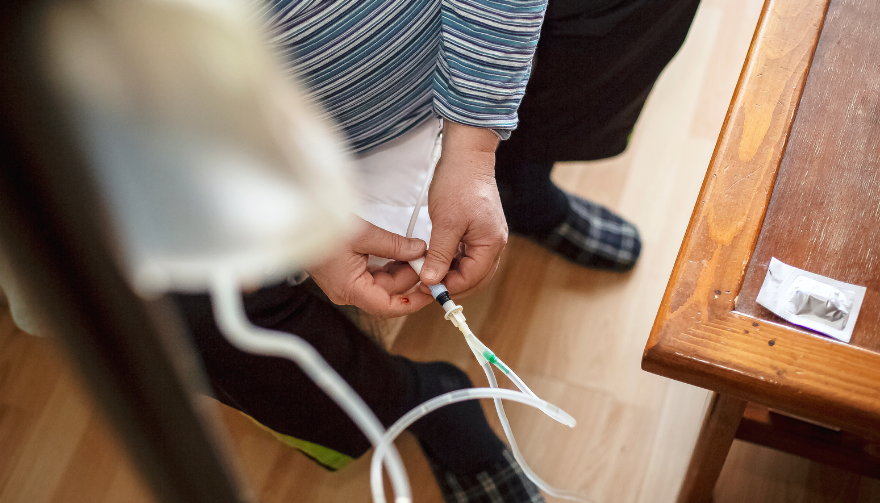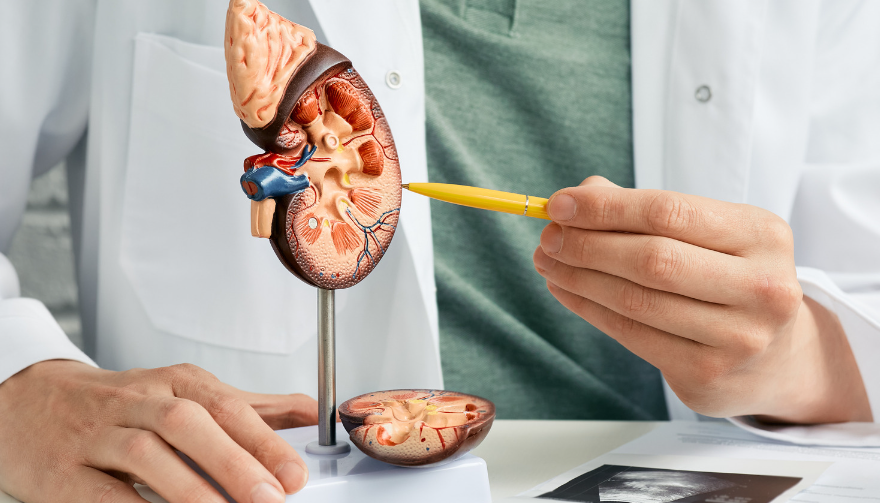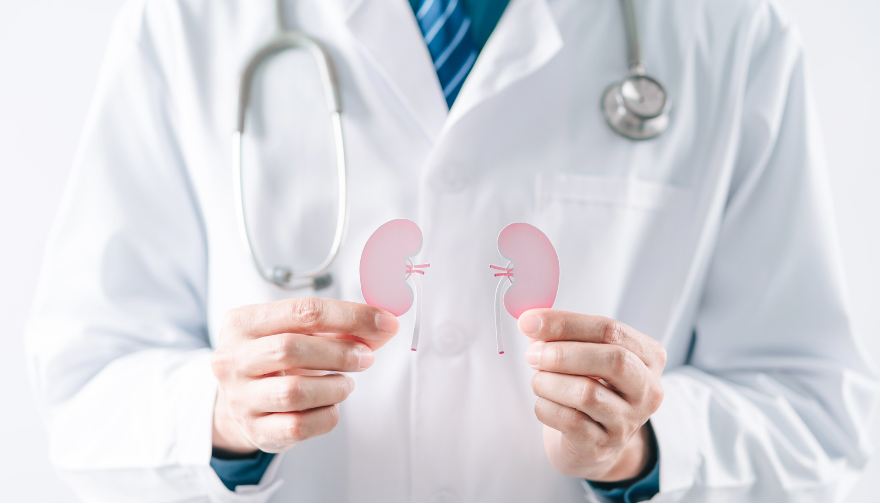Year: 2023
The Impact of Kidney Inflammation: Symptoms and Treatment
Our kidneys play a vital role in our bodies, as it filters waste products and excess fluids from our blood circulation. Kidney inflammation can have serious consequences for our health and bring on various signs. In this article, we will explore how kidney inflammation can affect us, including its symptoms, diagnosis and treatment options. What […]
Read MoreAll You Need to Know About Peritoneal Dialysis
Peritoneal dialysis is a viable option for patients whose kidneys are unable to filter wastes and excess fluids from the body. In this article, we will explore the fundamentals of peritoneal dialysis; its purpose, who can benefit from it, its pros and cons, and what to expect while undergoing treatment. How does Peritoneal Dialysis (PD) […]
Read MoreThings to Know About Proteinuria
Proteinuria is a medical condition characterised by excessive amounts of protein in the urine, causing bubbles to form during urination. It is not a disease but a symptom of an underlying medical condition. Proteinuria can also be a sign of kidney damage. Therefore, it is crucial to identify the underlying cause to prevent further kidney […]
Read MoreWhat Is the Most Common Cause of Blood in Urine (Hematuria)?
What Is Blood in Urine (Hematuria)? If blood is detected in your urine, you may be suffering from a medical condition known as hematuria. The blood may be visible to the naked eye, causing the urine to appear pink, red, or brown, or it may only be detected by laboratory testing. Hematuria can indicate underlying […]
Read MoreChronic Kidney Disease: Causes & Symptoms
Millions of individuals worldwide suffer from chronic kidney disease (CKD). Yet, it often goes undiagnosed until it progresses to end-stage kidney disease. Like any life-threatening illness/ disease, early detection and treatment can help slow or even stop the progression of this disease.
In this article, we will take a closer look at what chronic kidney disease is, the causes of kidney failure, its signs and symptoms, and how it is diagnosed and treated.
What Is Chronic Kidney Disease?
Chronic kidney disease is a progressive illness in which the kidneys’ functions deteriorate over time, affecting their role in regulating blood pressure, producing hormones, and maintaining a healthy balance of minerals and fluids.
The kidneys, a pair of bean-shaped glands in the lower abdominal cavity, are essential for bodily functions and general wellness. The kidneys are crucial for many causes, including:
► Waste Removal: The kidneys filter waste products from the blood and excrete them from the body as urine. The kidney plays a vital role in removing harmful substances from the body, such as urea, creatinine, and excess electrolytes.
► Blood Pressure Regulation: The kidneys help regulate blood pressure by producing a renin hormone. By increasing the production of angiotensin, a hormone that constricts blood arteries and elevates blood pressure, renin maintains a healthy cardiovascular system.
► Electrolyte Balance: The kidneys regulate the balance of electrolytes in the body, such as phosphorus, potassium, and sodium. This is important for maintaining normal heart and muscle function.
► Red Blood Cell Production: The hormone erythropoietin is manufactured in the kidneys and triggers the bone marrow to produce red blood cells.
► Acid-Base Balance: The kidneys help regulate the body’s acid-base balance by filtering out excess acids and retaining bicarbonate, which acts as a buffer to neutralise acids.
The degree of renal damage and kidney function are used to categorise chronic kidney disease (CKD) into five stages; Stage 1 is the mildest, while stage 5 is end-stage kidney disease (ESKD). When an individual is diagnosed with end-stage kidney disease, it typically requires treatment, such as a kidney transplant or dialysis, to sustain life.
Causes of Chronic Kidney Disease
Hypertension and diabetes are the two leading causes of kidney failure. Still, it can also result from other conditions such as glomerulonephritis (inflammation of the small blood vessels in the kidneys), polycystic kidney disease (an inherited disorder that causes cysts to form in the kidneys), and kidney damage from certain medications or toxins
Symptoms of Kidney Disease
Kidney failure symptoms may be subtle and may not appear until the later stages of the disease. Renal failure is characterised by several symptoms, including:
► Fatigue and weakness
► Swelling in the legs, ankles, or feet
► Shortness of breath
► Nausea and vomiting
► Loss of appetite
► Confusion or difficulty concentrating
► Abnormal heart rhythms
► Muscle cramps and twitching
► Itchy skin or skin rash
► Urinary changes, including decreased urine output or dark-colored urine.
Blood tests to measure waste products like creatinine and blood urea nitrogen, urine tests to measure the quantity of protein in the urine, and imaging tests such as ultrasound or CT scan are commonly used together to diagnose chronic kidney disease.
There are multiple ways to prevent kidney failure, ranging from dietary and lifestyle modifications (like reducing salt intake, smoking cessation, reducing carbohydrate and processed food, and exercising regularly)) to treatment with medication and, in severe cases, undergoing dialysis or a kidney transplant.
CKD risk factors include diabetes, high blood pressure, or a family history of kidney disease. If present, regular medical check-ups and monitoring of the renal function tests, are essential to avoid the need for dialysis or transplantation.
If you suspect you may have kidney disease symptoms, do not hesitate to reach out and contact us for more information.
Read MoreMyths & Facts About Kidney Disease
Common Misconceptions and the Real Story Behind Kidney Failure
If ignored, kidney disease may lead to symptoms and complications like acute kidney failure. Unfortunately, numerous myths are circulating about kidney disease, making it difficult for the “untrained” eye to separate the myth from the truth about each condition accurately.
► Myth 1: Kidney disease only affects older people.
Fact: While it is true that the risk of kidney disease increases with age, it can affect people of all ages, including children. Certain health conditions, such as diabetes and high blood pressure, can also increase the risk of kidney disease at any age.
► Myth 2: Kidney disease always causes symptoms.
Fact: In the early stages of kidney disease, there may be no symptoms, hence commonly recognized as a “silent” disease. Symptoms may only appear when the disease has progressed to a more advanced stage.
► Myth 3: Kidney disease is caused by poor diet and lifestyle choices.
Fact: While poor diet and lifestyle choices can contribute to the development of kidney disease, many other factors can cause kidney disease, including genetic factors, autoimmune diseases, cancer, medications, and infections.
► Myth 4: If you have kidney disease, you need dialysis treatment or a kidney transplant.
Fact: While it is true that some people with kidney disease will eventually need dialysis or a kidney transplant, many others are able to manage their condition through medication and lifestyle changes. With early detection and the appropriate treatment, the need for dialysis or transplant may be avoided.
► Myth 5: Kidney disease is not preventable.
Fact: While some risk factors for kidney disease, such as age and family history, cannot be changed, steps can be taken to reduce the risk of developing the condition. These include maintaining a healthy diet, staying physically active, controlling blood pressure and blood sugar levels, avoiding tobacco and excessive alcohol consumption, and getting regular check-ups with a healthcare provider.
► Myth 6: Only people with diabetes or high blood pressure are at risk for kidney disease.
Fact: While diabetes and high blood pressure are the leading causes of kidney disease, there are other risk factors that can lead to kidney disease. These include a family history of kidney disease, obesity, smoking, autoimmune diseases, and kidney infections.
► Myth 7: Avoid all protein in your diet if you have kidney disease.
Fact: Protein is an essential nutrient required to maintain overall health. People with kidney disease should work with their kidney specialist to develop an individualized diet plan that meets their nutritional needs.
► Myth 8: Kidney disease is always a chronic, lifelong condition.
Fact: While some forms of kidney disease are chronic and may require long-term management, there are other types that can be cured with appropriate kidney failure treatment. For example, acute kidney injury (AKI) is a sudden onset of renal failure caused by medication toxicity, dehydration, or infections. And in most cases, AKI can be reversed if detected early and treated promptly.
► Myth 9: Drinking lots of water can cure kidney disease.
Fact: While staying hydrated is essential for kidney health, drinking excessive water may not cure kidney disease. Drinking too much water can be harmful, especially for people with advanced-stage kidney disease, as they may have difficulty excreting excess fluids. Therefore, drinking enough water to stay hydrated is essential, but not too much that it puts unnecessary strain on the kidneys.
► Myth 10: Kidney disease is not a severe health condition.
Fact: Kidney disease is a severe health condition that may have significant impact and consequences if left untreated. It can lead to complications such as high blood pressure, anaemia, acidosis, heart problems, and bone disease. In advanced cases, it will lead to kidney failure, which requires either dialysis or a kidney transplant.
Read MoreAll About Glomerulonephritis – Symptoms, Diagnosis and Treatment
Introduction to Glomerulonephritis
A glomerulus is a filtering system that consists of tiny blood vessels, responsible for filtering waste and excess fluids from the blood. We have approximately one million glomeruli in each kidney. An inflammation of the glomeruli is known as glomerulonephritis. When the glomeruli become inflamed, they cannot function properly, leading to a range of symptoms, including blood and protein in the urine, swelling in the legs and face, and high blood pressure.
There are many types of glomerulonephritis, each with its cause and risk factors. Some types are temporary and can be treated easily, while others are chronic and can lead to permanent kidney damage.
This article will discuss glomerulonephritis’s origins, the available treatment options, and tips for preventing and managing this disease.
Causes of Glomerulonephritis
There are many potential reasons for this kidney inflammation, including:
► Infections: Streptococcus, staphylococcus, and viral infections like hepatitis B and C, HIV infections are some causes of glomerulonephritis.
► Autoimmune disorders: Some autoimmune diseases cause the immune system to target healthy organs, such as the kidneys, resulting in conditions such as Goodpasture syndrome, ANCA vasculitis, or lupus nephritis.
► Medications: Antibiotics, nonsteroidal anti-inflammatory drugs (NSAIDs), and some gout medications can induce glomerulonephritis.
► Genetic or hereditary factors: Some forms of glomerulonephritis, such as Alport syndrome, are inherited or have a genetic component.
► Unknown causes: Many instances of glomerulonephritis have unknown origins and are frequently referred to as “idiopathic glomerulonephritis” in medical terms.
Not all types of glomerulonephritis have a clear cause. It is possible that a combination of factors led to the onset of the disease in some patients. Therefore, glomerulonephritis treatment will depend on the underlying cause and may include medications to reduce inflammation, control blood pressure, or suppress the immune system. In some cases, more aggressive treatments such as dialysis or kidney transplant may be necessary if the condition has led to significant kidney damage.
Treatment for Glomerulonephritis
Glomerulonephritis treatment will depend on the underlying cause and the severity of the condition. Some of the common treatments for glomerulonephritis include:
► Medications: In many cases, medications can help reduce inflammation and control the immune system to prevent further kidney damage. Depending on the underlying cause of glomerulonephritis, a doctor may prescribe corticosteroids, immunosuppressant drugs, medications to manage symptoms (e.g. swelling, high blood pressure), and medications to reduce the potential side effects of the immunosuppressant medications.
► Blood pressure control: High blood pressure is a common complication of glomerulonephritis and can worsen kidney damage. A doctor may prescribe medications such as ACE inhibitors or angiotensin receptor blockers (ARBs) to manage blood pressure.
► Dietary changes: A doctor may recommend changes to a patient’s diet to help manage symptoms of glomerulonephritis, such as limiting sodium, protein, and phosphorus intake.
► Dialysis: In some cases, glomerulonephritis can lead to significant kidney damage. A patient may require dialysis to filter waste and excess fluids from the blood. This treatment may be temporary until the kidney recovers from the glomerulonephritis.
► Kidney transplant: If glomerulonephritis has led to end-stage renal disease (ESRD), a kidney transplant may be necessary to replace the damaged kidney with a healthy donor kidney.
Reduce the Risks of Glomerulonephritis
Due to various contributing factors, it may be impossible to prevent glomerulonephritis completely. However, some steps may help lower the chances of developing glomerulonephritis or reduce the risk of complications, including:
► Practice good hygiene: Some forms of glomerulonephritis are caused by infections; therefore, it is essential to practice good hygiene to avoid getting sick. This includes washing hands frequently, avoiding close contact with people who are unwell, and staying up-to-date with vaccinations.
► Manage underlying health conditions: Certain conditions, such as high blood pressure, diabetes, and autoimmune disorders, can increase the risk of developing glomerulonephritis. Managing these conditions can help lower its risk.
► Avoid exposure to harmful substances: Certain toxins and chemicals, such as heavy metals and solvents, can increase the risk of kidney damage and glomerulonephritis. It is vital to take appropriate safety measures to avoid exposure to these substances.
► Stay hydrated: Maintaining healthy renal function and eliminating waste products requires regular water consumption.
► Get regular checkups: Regular checkups with a healthcare provider can help detect any underlying health conditions or kidney problems early before they progress and cause complications.
While these steps may not eliminate the risk of developing glomerulonephritis, they can help promote overall kidney health and reduce the risk of complications. If someone is experiencing symptoms of glomerulonephritis or is concerned about their kidney health, they should speak with a healthcare provider for an evaluation and appropriate treatment.
Read MoreThings to Know About Chronic Kidney Disease – Symptoms, Diagnosis & Treatment
Chronic kidney disease (CKD) is a disorder in which the kidneys start losing function over time. The kidneys refer to the bean-shaped organs that sit on either side of the spine under the rib cage. They are essential for regulating fluid and electrolyte balance, flushing out waste, and keeping you healthy. Damaged kidneys are unable to filter waste products in people with chronic kidney disease.
Chronic kidney disease is a progressive disorder, which means that it worsens over time as the disease progresses. This condition can be caused by a number of factors, including chronic high blood pressure, diabetes, kidney infections, autoimmune diseases, polycystic kidney disease, and prolonged use of certain medications. Other risk factors may include ageing, smoking, obesity and a family history of kidney disease. A nephrologist from Singapore can diagnose it through tests that evaluate kidney function.
Symptoms of Chronic Kidney Disease
The symptoms of chronic kidney disease often develop slowly and may not be detectable in the early stages. However, as the condition advances, many people experience the following symptoms:
► Fatigue and weakness
► Swelling in the legs, ankles, and feet
► Dry, itchy skin
► Nausea and vomiting
► Loss of appetite
► Trouble sleeping
► Muscle cramps
► Change in urine output or appearance
► Difficulty concentrating
► High blood pressure
It is important to note that some people with chronic kidney disease may not experience any symptoms in the early stages of the disease therefore regular check-ups and screenings are essential for early detection and effective management. If you experience any symptoms that concern you or have a family history of renal disease, speak with your doctor for a proper evaluation.
Diagnosis
Chronic Kidney Disease is typically diagnosed through a combination of tests and evaluations. Some common diagnostic tests and procedures a nephrologist in Singapore may perform include:
► Blood test: To measure levels of waste products, such as creatinine and blood urea nitrogen (BUN), in the blood. Increased levels may suggest renal disease.
► Urine test: To check for the presence of blood or protein in the urine, which can indicate kidney damage or disease.
► Glomerular filtration rate (GFR) test: To measure how effectively the kidneys are filtering waste products from the blood.
► Imaging studies: Such as ultrasound, CT scans, or MRI scans, to create images of the kidneys and surrounding structures.
► Kidney biopsy: A procedure in which a small sample of kidney tissue is removed and studied under a microscope to help diagnose and determine the cause of kidney disease.
These tests can help determine the severity of kidney disease and guide the development of a treatment plan. Do keep in mind that early detection and treatment of chronic kidney disease can slow down the progression of the disease and help preserve kidney function.
Treatment
The treatment options for chronic kidney disease vary depending on the severity of the disease and other individual factors, such as overall health and underlying medical conditions. Some common treatments for chronic kidney disease include:
► Lifestyle changes: Changing your diet, exercise habits, and managing other health conditions, such as high blood pressure or diabetes, can help slow down its progression.
► Medications: Medications, such as angiotensin receptor blockers (ARBs) and angiotensin-converting enzyme inhibitors (ACE inhibitors), can help control blood pressure, reduce proteinuria, and slow down the progression of kidney disease. Sodium/glucose co-transporter-2 inhibitors (SGLT2i) can also help with treating various kidney conditions.
► Dialysis: A procedure that helps filter waste products from the blood in patients with end-stage renal disease, it may be performed at a dialysis center or at home depending on an individual’s suitability and preference.
► Kidney transplant: A surgical procedure in which a healthy kidney from a donor is transplanted into the body of a patient with end-stage renal disease.
These are examples of the treatment available for chronic kidney disease, the finalised treatment plan will depend on the patient’s individual needs and the nature of their kidney-related condition. It is important to work closely with a nephrologist in Singapore to determine the best course of action for your kidney care.
Read MoreWhat You Need to Know About Kidney Clinics and Specialists
A kidney specialist also referred to as a nephrologist, is a medical professional that specialises in the treatment and diagnosis of diseases and disorders of the kidneys, such as chronic kidney disease, kidney failure, and kidney inflammation.
A nephrologist can help diagnose kidney disease at an early stage and provide the necessary treatments to slow its progression and prevent complications. Additionally, they can also help manage conditions such as end-stage renal disease, which require specialised care available in kidney clinics in Singapore.
Nephrologists perform a range of tasks, including:
► Diagnosing kidney diseases and conditions: Nephrologists use a variety of tests, such as blood and urine tests, imaging studies, and biopsy procedures, to diagnose kidney diseases.
► Monitoring kidney function: They regularly assess the health and function of the kidneys in patients with kidney disease or other kidney-related conditions.
► Developing treatment plans: Kidney specialists in Singapore work with patients to create personalised treatment plans, that includes medications, lifestyle changes, and other therapies to manage kidney disease and prevent further damage to the kidneys.
► Managing complications: Nephrologists are trained to handle the difficulties of kidney disease, such as high blood pressure, anaemia, and bone disease.
► Providing dialysis: They customise and manage dialysis treatments for patients.
► Coordinating care: Nephrologists work closely with other healthcare providers, such as primary care physicians, surgeons, and transplant specialists, to provide comprehensive care for patients with kidney disease.
Conditions Treated by a Kidney Specialist
Kidney specialists in Singapore treat a wide range of kidney-related diseases and conditions, including:
► Chronic kidney disease (CKD): A condition in which the kidneys gradually lose function over time.
► Acute kidney injury (AKI): A rapid and abrupt decline in kidney function.
► Kidney stones: Kidney stones are painful crystals that harden in the kidneys and pass through the urinary system.
► Glomerulonephritis: Inflammation of the kidneys’ microscopic filters.
► Nephrotic syndrome: A combination of signs and symptoms brought on by damaged renal filtration.
► Hypertensive nephropathy: Damage in the kidneys caused by high blood pressure.
► Diabetes-related kidney disease: Kidney damage caused by high blood sugar levels in people with diabetes.
► End-stage renal disease (ESRD): A severe and irreversible loss of kidney function that requires dialysis or kidney transplantation.
► Kidney tumours: Benign or malignant growths that develop in the kidneys.
These are just a few examples of the types of diseases and conditions that nephrologists treat. By diagnosing and treating these conditions at kidney clinics in Singapore, nephrologists help to maintain good kidney health and prevent further complications.
Tests and Procedures a Nephrologist Might Perform
Nephrologists utilise a variety of tests and procedures to diagnose and treat kidney-related diseases and conditions, including:
► Blood tests: To measure levels of waste products, electrolytes, and other substances that can indicate kidney problems.
► Urine tests: To check for the presence of protein, blood, and other substances that can indicate kidney disease.
► Imaging studies: Including ultrasound, CT scans, and MRI scans to create images of the kidneys and surrounding structures.
► Biopsy: A method for diagnosing and identifying the root cause of renal disease in which a tiny piece of kidney tissue is removed and studied under a microscope.
► Dialysis: A procedure that artificially filters waste products from the blood in patients.
► Kidney function tests: To measure the function of the kidneys and determine how well they are working.
► Renal artery angiography: A procedure that uses X-rays and a special dye to visualise the blood vessels in the kidneys and check for blockages or other abnormalities.
If you suspect you may have kidney disease symptoms, do not hesitate to reach out to a kidney specialist in Singapore! Contact us for more information.
Read More








